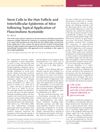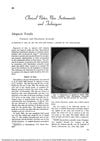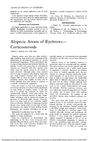Fluocinolone
🛒 Where to find Fluocinolone
Tracking 1 topical product by companies like Inhouse Pharmacy. View product »Research
20 / 229 results
research Contact Alopecia: Improvement of Alopecia with Discontinuation of Fluocinolone Oil in Individuals Allergic to Balsam Fragrance
Stopping the use of fluocinolone oil containing balsam fragrance improved hair regrowth in children allergic to it.

research Stem Cells in the Hair Follicle and Interfollicular Epidermis of Mice Following Topical Application of Fluocinolone Acetonide
Fluocinolone acetonide slows down hair follicle stem cells but speeds up skin cell growth in mice.
research Topical Fluocinolone Acetonide Acetate Ointment in Autosomal Dominant Congenital Hypotrichosis
A hair growth ointment improved hair length in a family with a genetic hair growth condition.

research Alopecia Totalis: Significant Hair Regrowth with Fluocinolone Acetonide Cream
A woman regrew her hair significantly using a corticosteroid cream with a plastic cover.

research Folliculitis Decalvans Developing 20 Years After Hair Restoration Surgery in Punch Grafts: Case Report
A man developed a rare scalp disorder, Folliculitis Decalvans, 20 years after hair restoration surgery, and it required long-term antibiotic treatment.

research Toxic Epidermal Necrolysis Caused by Skin Hypersensitivity to Monosulfiram
A woman's severe skin reaction was caused by an allergy to a skin treatment.

research Congenital Atrichia
Congenital atrichia is a rare condition where children are born without hair, and treatment is often ineffective.

research Production of Ultraviolet-Light-Induced Skin Erythema in the Hairless Rat: A Comparison with the Haired Rat in Screening for Anti-Inflammatory Drugs
Hairless rats are good for testing anti-inflammatory drugs, similar to haired rats, without needing to remove fur.

research An Update on Scalp Psoriasis
Scalp psoriasis treatments like strong corticosteroids and vitamin D3 analogues are effective, especially when combined.

research Personalized Compounded Hair Loss Treatments: A Compatibility Assessment of the TrichoConcept Vehicle Line
The TrichoConcept™ line is effective for personalized hair loss treatments.

research Hair: More Than Just an Appendage
A boy and his father with hereditary hypotrichosis simplex were treated for hair loss, but the treatment result is unknown.

research Scalp Psoriasis Associated with Central Centrifugal Cicatricial Alopecia
A woman's severe hair loss was caused by scalp psoriasis, not the initially thought condition, and treatment improved her psoriasis but couldn't restore her lost hair.

research Alopecia Areata in a Renal Transplant Recipient on Cyclosporin
A kidney transplant patient on cyclosporin experienced unexpected severe hair loss, which improved with treatment adjustments.

research Dorsal Skin Reactions of Hairless Dogs to Topical Treatment with Corticosteroids
Stronger corticosteroids cause more skin damage in hairless dogs, similar to effects in humans.

research Cervical Cancer Metastasis to the Scalp Presenting as Alopecia Neoplastica
A woman with cervical cancer had rare scalp metastasis causing a unique type of hair loss.

research Epithelial Cells in the Hair Follicle Bulge Do Not Contribute to Epidermal Regeneration After Glucocorticoid-Induced Cutaneous Atrophy
Hair follicle bulge cells don't help skin regrow after glucocorticoid damage; interfollicular epidermis cells do.

research Alopecia Areata of Eyebrows—Corticosteroids
Corticosteroid injections helped eyebrow hair regrow in men with alopecia areata.

research Congenital Triangular Alopecia
Congenital triangular alopecia is more common than thought and some treatments can be beneficial for appearance concerns.

research Alopecia in a 19-Month-Old Boy
A 19-month-old boy with a rare hair disorder showed mild improvement with treatment, but his family chose gentle hair care due to limited success.

research Large Doses of Glucocorticoid in the Treatment of Alopecia Areata
Large doses of glucocorticoids are not suitable for general use in treating severe alopecia areata due to inconsistent results and risks.
